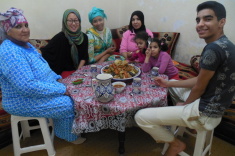 I had heard this word several times in conversation before actually knowing what it meant. But one night over dinner, I came to understand that “jutto” refers to a type of pollution of food once it has been touched by the germs of another. When food is jutto it is unclean for anyone to eat besides the person who has contaminated the food.
I had heard this word several times in conversation before actually knowing what it meant. But one night over dinner, I came to understand that “jutto” refers to a type of pollution of food once it has been touched by the germs of another. When food is jutto it is unclean for anyone to eat besides the person who has contaminated the food.
The first time I learned about this, I didn’t really think much of it – it sounded somewhat similar to ideas that we Westerners have about food. It also has the practical result of not getting someone’s cold germs (though that is counteracted by coughing and sneezing without covering one’s mouth, which is the norm in Nepal).
But the more I learned about how jutto actually affects my family members, the more it seems annoying, and even a little bit overly-paranoid. I mean, I understand if someone doesn’t want to share their meal or drink with a complete stranger, but because of jutto even family members won’t eat anything from the same plate – even if they are snacks or a sip of water from one’s glass. Our mom won’t even take the jutto from her children! The only people who are allowed to share jutto are husband and wife – and even that is a little one-sided, as it is more OK for the wife to eat her husband’s leftovers than the other way around.
I’m not positive about it, but I think this is strictly Hindu practice. I’d have to check with Muna on it, but I remember that her family didn’t seem overly concerned about jutto. Her father would even take the extra vegetables off my plate if I was too full to finish – and I’m not even technically a family member!
I remember that one of my first days of school, a water bottle was being passed around for all the teachers to drink from. Without thinking I took a sip with my lips on the bottle. I don’t know if any teacher saw or if they were disgusted at all, but now that I know about jutto I am mildly embarrassed that I committed such a faux-pas. At the time I just assumed that Nepalis were the complete opposite, both because of my experience in Muna’s home and also because their eating habits, up to that point, seemed so similar to that of the Senegalese. And if you recall, the Senegalese have no notion whatsoever of jutto. Complete strangers will eat out of the same common bowl and, though this may sound disgusting to most of you, I recall my mom scooping the leftovers from the common bowl back into the uneaten food, putting it in the fridge, and serving it for lunch the next day (yes, she was cheap, but this nonetheless illustrates my point).
Well, I guess the lesson of the day is that not all cultures are the same so I cannot make any assumptions. Genius!
P.S. I just wrote this entry 30 minutes ago and then found out some new, intriguing information about jutto. It turns out that sisters can share jutto in a limited capacity. I found this out because I saw two spoons in Aartee’s noodles. When I asked whose was the other spoon she said it was Jyoti’s. I don’t know why sisters are the exception to this seemingly-strict rule, but it made me jealous! I asked if I could share jutto as well as Aartee just laughed and brushed it off. But I obstinately said that they always call me their sister so I should be allowed to share jutto as well. I pretended to be more upset than I really was, but later Jyoti came into my room when I was drinking tea and demanded to give me my tea. When I did, she took a sip of it, exclaimed “See, we are sisters!” and walked out of the room.
Only my two bhaujus are allowed to prepare the food and serve it to Mama. The rest of us aren’t even allowed to TOUCH it until Mama has eaten. If any of us DO touch it, she won’t eat it because it is jutto. This is especially so for daal, for whatever reason – it’s sacred or something.
This rule has made the dynamics around dinnertime quite interesting. Before I knew the rule, I came SO close to “polluting” the food, but Sampada managed to stop me in time. I can’t help but wonder how Mama’s daughters are supposed to practice cooking daal for their future families if they aren’t even allowed to cook it at their own home. And I also wonder why exactly the Bhaujus, who aren’t even blood relatives, are pure enough to cook the daal and rice but Mama’s own children aren’t!
It’s a strange, fascinating world over here.
P.P.P.S. Update on my new little sister, Muna. She has been here for 4 days now, and still doesn’t speak. She is extremely shy and actually a little naughty – she won’t even turn around to look at you if you call her name or talk to her. I wonder when she’ll settle in.
The one thing she is fascinated by is electronic screens. If the TV is on, she is there, glued to the set until it is turned off. The same thing is true with the computer. The only time I know she’ll spend time with me is if I’m on the computer – she’ll come and sit by me and watch, hypnotized, as I visit my various sites and type my e-mails. A few days ago, I took a picture of her with my digital camera and immediately put it on the computer. When she saw herself on the computer, she began to giggle. So I began to giggle. Then she started to laugh a little harder – so did I. Soon she was having a laughing attack so loudly and intensely that I thought she was going to start crying. That is probably the only time she’s ever uttered a sound to me. Guess I know where my leverage stands.


